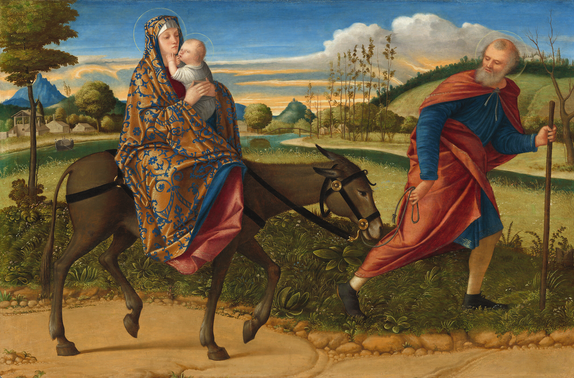Matthew 2:13-23
Lesson 3
Lesson 3
Read both the "King James Bible" and the "New Living Translation."
In this lesson:
Escape to Egypt.
The Flight to Egypt.
By Italian painter Vittore Carpaccio (1465-1525).
By Italian painter Vittore Carpaccio (1465-1525).
Study Tip:
The more we know about the old prophecies, the Mosaic Law, and
the First Covenant, the more we understand the New Testament.
Always click on the Old Testament links and the blue "Margin Notes,"
they are important tools that help us understand God's plan for mankind.
The more we know about the old prophecies, the Mosaic Law, and
the First Covenant, the more we understand the New Testament.
Always click on the Old Testament links and the blue "Margin Notes,"
they are important tools that help us understand God's plan for mankind.
Who was -
Jeremiah -
Jeremiah was a Hebrew prophet, also called Jeremy or Jeremias (Matthew 16:14). He is the author of The Old Testament books "The Lamentations of Jeremiah" and "The Book of the Prophet Jeremiah." From the village of Anathoth (Jeremiah 1:1), three miles northeast of Jerusalem, God "ordained" him a prophet before he was born (Jeremiah 1:5). Jeremiah lived in the sixth and seventh centuries BC. He was known as the "weeping prophet." His story is one of perseverance, as he was persecuted by his fellow Jews and even his own family (Jeremiah 12:6) for prophesying that, unless Israel renounced its idolatry, it would fall into the hands of their enemies. Four successive Jewish kings ignored his warnings to repent. Jeremiah was imprisoned (Jeremiah 37:15), and King Jehoiakim (of Judah) tried several times to kill him (Jeremiah 36:26). Finally, God punished Israel for its sins. The Babylonians defeated the Israelites and destroyed Jerusalem. Many Jews, including King Jehoiakim, were taken to Babylon as slaves. Jeremiah eluded the Babylonians and fled to Egypt. He correctly predicted that Israel's captivity would last seventy years (Jeremiah 25:11) and that Babylon would be destroyed. You can learn more in "The Book of the Prophet Jeremiah."
Archelaus -
The son of King Herod the Great and Malthace. Educated in Rome, Archelaus was given half of his deceased father's kingdom by the Roman Emperor Caesar. He ruled Idumea, Judea, and Samaria for almost ten years. His brother, Herod Antipas, ruled the other half of Herod's kingdom. It was Antipas who beheaded John the Baptist (Matthew 14:1-11; Mark 6:21-28) and "mocked" Jesus (Luke 23:11). Archelaus was also known for his cruelty. His harsh reputation is probably why Joseph avoided Judea when he returned to Israel from Egypt with the infant Messiah (Matthew 2:22). Archelaus was eventually deposed by the Romans, stripped of his wealth, and exiled to Gaul.
Jeremiah -
Jeremiah was a Hebrew prophet, also called Jeremy or Jeremias (Matthew 16:14). He is the author of The Old Testament books "The Lamentations of Jeremiah" and "The Book of the Prophet Jeremiah." From the village of Anathoth (Jeremiah 1:1), three miles northeast of Jerusalem, God "ordained" him a prophet before he was born (Jeremiah 1:5). Jeremiah lived in the sixth and seventh centuries BC. He was known as the "weeping prophet." His story is one of perseverance, as he was persecuted by his fellow Jews and even his own family (Jeremiah 12:6) for prophesying that, unless Israel renounced its idolatry, it would fall into the hands of their enemies. Four successive Jewish kings ignored his warnings to repent. Jeremiah was imprisoned (Jeremiah 37:15), and King Jehoiakim (of Judah) tried several times to kill him (Jeremiah 36:26). Finally, God punished Israel for its sins. The Babylonians defeated the Israelites and destroyed Jerusalem. Many Jews, including King Jehoiakim, were taken to Babylon as slaves. Jeremiah eluded the Babylonians and fled to Egypt. He correctly predicted that Israel's captivity would last seventy years (Jeremiah 25:11) and that Babylon would be destroyed. You can learn more in "The Book of the Prophet Jeremiah."
Archelaus -
The son of King Herod the Great and Malthace. Educated in Rome, Archelaus was given half of his deceased father's kingdom by the Roman Emperor Caesar. He ruled Idumea, Judea, and Samaria for almost ten years. His brother, Herod Antipas, ruled the other half of Herod's kingdom. It was Antipas who beheaded John the Baptist (Matthew 14:1-11; Mark 6:21-28) and "mocked" Jesus (Luke 23:11). Archelaus was also known for his cruelty. His harsh reputation is probably why Joseph avoided Judea when he returned to Israel from Egypt with the infant Messiah (Matthew 2:22). Archelaus was eventually deposed by the Romans, stripped of his wealth, and exiled to Gaul.




